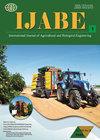LED光谱对茄子移栽生长及能源利用效率的影响
IF 2.2
2区 农林科学
Q2 AGRICULTURAL ENGINEERING
International Journal of Agricultural and Biological Engineering
Pub Date : 2023-01-01
DOI:10.25165/j.ijabe.20231603.7260
引用次数: 0
摘要
为了促进移植物的生长,降低能量利用效率,对茄子移植物(cv。在不同的LED光谱下,在植物工厂实验室培养荆芥21)。实验处理包括白光加蓝光LED灯(R: B=0.5, WB0.5)、白光加红光LED灯(R: B=0.9, W0.9)、白光加红光LED灯(R: B=2.7, WR2.7)、白光加红光加紫外灯(R: B=3.8, WRUV3.8)、红蓝加绿光LED灯(R: B=5.4, RBG5.4)。移植物在250 μmol/m2·s的光强和16 h/d的光周期下生长30 d。W0.9处理茄子移栽植株的形态指标和生物量积累均显著高于其他处理。W0.9处理的光合量子产率比WR2.7处理提高了22%以上。W0.9处理的地上部干重为(381±41)mg/株,叶面积为(113.3±8.9)cm2,健康指数高于其他处理。但各处理间叶片净光合速率无显著差异。W0.9处理的能量产率(EY)为(37.7±1.8)g/kW·h,高于其他处理。因此,考虑到移栽质量的提高和能源利用效率的最大化,茄子移栽生产中的LED光谱推荐使用R: B比为0.9的白光LED。关键词:茄子移栽,LED光谱,生长,能源利用效率DOI:杨慧,王婷,季峰,周强,王建峰。LED光谱对茄子移栽生长和能源利用效率的影响农业与生物工程学报,2023;16(3):。本文章由计算机程序翻译,如有差异,请以英文原文为准。
Effects of LED light spectrum on the growth and energy use efficiency of eggplant transplants
To enhance the transplants' growth and reduce energy use efficiency, Eggplant (Solanum melongena L.) transplants (cv. Jingqie 21) were cultivated in a plant factory laboratory under different LED light spectrums. The experimental treatments included white plus blue LED lights (R: B=0.5, WB0.5), white LED lights (R: B=0.9, W0.9), white plus red LED lights (R: B=2.7, WR2.7), white plus red plus UV lights (R: B=3.8, WRUV3.8), and red plus blue plus green LED lights (R: B=5.4, RBG5.4). The transplants were grown for 30 d under a light intensity of 250 μmol/m2·s and a photoperiod of 16 h/d. The morphological indicators and biomass accumulation of eggplant transplants were significantly higher in the W0.9 treatment compared to the other experimental treatments. The photosynthetic quantum yield in the W0.9 treatment exhibited an increase of over 22% compared to that in the WR2.7 treatment. The shoot dry weight of the W0.9 treatment reached (381±41) mg/plant and the leaf area was (113.3±8.9) cm2, indicating a higher health index compared to the other treatments. However, there were no significant differences in the net photosynthetic rate of the leaves among all treatments. The energy yield (EY) of the W0.9 treatment was (37.7±1.8) g/kW·h, which was higher than others. Therefore, considering the high quality of transplants and the maximization of energy use efficiency, the LED light spectrum in the eggplant transplants production was recommended to the white LED light with an R: B ratio of 0.9. Keywords: eggplant transplants, LED light spectrum, growth, energy use efficiency DOI: Citation: Yang H, Wang T, Ji F, Zhou Q, Wang J F. Effects of LED light spectrum on the growth and energy use efficiency of eggplant transplants. Int J Agric & Biol Eng, 2023; 16(3): 23–29.
求助全文
通过发布文献求助,成功后即可免费获取论文全文。
去求助
来源期刊

International Journal of Agricultural and Biological Engineering
AGRICULTURAL ENGINEERING-
CiteScore
4.30
自引率
12.50%
发文量
88
审稿时长
24 weeks
期刊介绍:
International Journal of Agricultural and Biological Engineering (IJABE, https://www.ijabe.org) is a peer reviewed open access international journal. IJABE, started in 2008, is a joint publication co-sponsored by US-based Association of Agricultural, Biological and Food Engineers (AOCABFE) and China-based Chinese Society of Agricultural Engineering (CSAE). The ISSN 1934-6344 and eISSN 1934-6352 numbers for both print and online IJABE have been registered in US. Now, Int. J. Agric. & Biol. Eng (IJABE) is published in both online and print version by Chinese Academy of Agricultural Engineering.
 求助内容:
求助内容: 应助结果提醒方式:
应助结果提醒方式:


